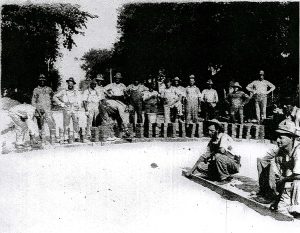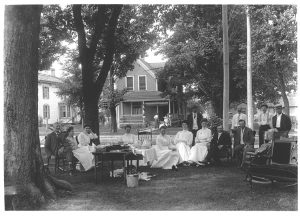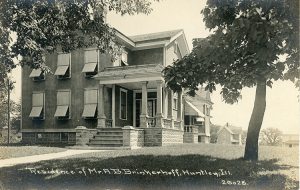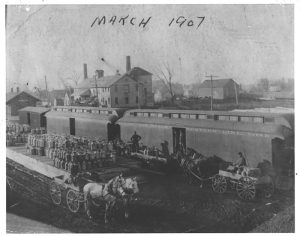 Huntley celebrated the 100th anniversary of the paving of Woodstock Street on May 6, 2017. Woodstock Street has been in existence for over 170 years. It began as a dirt path for horses and wagons and served as a rudimentary route from Woodstock to Huntley’s square. The square boasted many flourishing businesses and the train depot sat just south of the square where Woodstock Street ended. Farmers driving wagons heavy with milk cans and horses struggled along the street during inclement weather when the road became muddy. In 1916, the Village of Huntley voted to brick the surface to make travel easier. The brickwork on Woodstock Street was competed in February 1917.
Huntley celebrated the 100th anniversary of the paving of Woodstock Street on May 6, 2017. Woodstock Street has been in existence for over 170 years. It began as a dirt path for horses and wagons and served as a rudimentary route from Woodstock to Huntley’s square. The square boasted many flourishing businesses and the train depot sat just south of the square where Woodstock Street ended. Farmers driving wagons heavy with milk cans and horses struggled along the street during inclement weather when the road became muddy. In 1916, the Village of Huntley voted to brick the surface to make travel easier. The brickwork on Woodstock Street was competed in February 1917.
Life on Woodstock Street
Huntley residents enjoyed a summer party on the front lawn of the Ed Cook home on Woodstock Street. Businessman Ed Cook (1863-1951) is seated at the far left. Mr. Cook was the county coroner, town funeral director and Huntley fire chief for many years.

The home of town founder Thomas Stillwell Huntley sits at the corner of Woodstock and Third streets. When Thomas Huntley died in 1894, he left the home to his brother-in-law Abram Brinkerhoff, who was named guardian for Huntley’s young son. The Brinkerhoffs lived in the home until their deaths in the 1920s, after which it became the property of Thomas Huntley Jr.

Woodstock Street led across Main Street and to the Huntley Depot, where local farmers dropped milk cans to be loaded onto trains headed to Chicago or other points east. Note the large number of cans waiting to be put onto the train on a March morning in 1907. The large building in the background was one of the major local milk factories and was owned by Cornell Brothers.
Landmarked & Restored
The McHenry County Historic Preservation Commission landmarked the brick street in 1998. The street had fallen into disrepair and was re-bricked and restored by 2000. The village of Huntley acquired more than $380,000 in state grant money for the re-bricking project. The total project cost was about $475,000.
